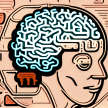The Domino Effect
Unraveling the Interconnectedness of Events

The domino effect is a fascinating phenomenon that highlights the interconnected nature of events. Just like a line of dominoes, where the fall of one piece triggers a cascade, various events in our world are interconnected and can have far-reaching consequences. This concept is not limited to physical objects but also applies to various aspects of our lives, including economics, politics, and even personal relationships. Understanding the domino effect is crucial in comprehending the complexity of our world and the significance of seemingly insignificant events.
interconnectedness in Nature and Science:
Nature offers numerous examples of the domino effect. For instance, an alteration in the delicate balance of an ecosystem, such as the introduction of an invasive species, can disrupt the entire food chain and lead to ecological imbalances. Similarly, in physics, the domino effect is evident in the concept of chain reactions, where the release of energy from one reaction fuels subsequent reactions. This is seen in nuclear reactions and even in everyday combustion processes like fire.
Economic Dominoes:
In the realm of economics, the domino effect is frequently observed. The global financial crisis of 2008 serves as a poignant example. The collapse of several major banks and financial institutions had a ripple effect that quickly spread across the globe, leading to widespread economic turmoil. The interconnectedness of financial systems meant that the failure of a few institutions had severe consequences for the entire global economy.Furthermore, supply chains in various industries demonstrate how disruptions at one point can impact the entire network. A natural disaster or political instability in a region can disrupt the production of essential components, affecting multiple downstream industries reliant on those components. This interconnectedness amplifies the effects and can lead to economic downturns or shortages in diverse sectors.
Socio-Political Dominoes:
The domino effect is not confined to the realm of economics but also manifests in the socio-political landscape. A single event, such as a protest or political uprising, can spark a chain reaction that cascades into larger movements or even revolutions. The Arab Spring, which began in Tunisia in 2010, quickly spread across the Middle East, toppling governments and reshaping the political landscape of the region.Additionally, technological advancements and the rise of social media have further accelerated the domino effect in socio-political contexts. Information and ideas can spread rapidly, inspiring and mobilizing individuals on a global scale. The power of a single viral video or social media post can initiate a domino effect of awareness, activism, and change.
Personal Dominoes:
On an individual level, the domino effect is equally significant. Our personal choices and actions can have a profound impact on our lives and the lives of those around us. Small decisions, such as adopting healthier habits or pursuing education, can lead to a cascade of positive changes that transform our overall well-being. Likewise, negative choices, such as engaging in destructive behaviors or associating with toxic individuals, can trigger a series of adverse events with lasting consequences.
When researchers hear "domino effect" they always remember the incidents of the Vietnam war, when american military thought if Vietnam fall in to communsim then other countries will follow.
Vietnam and the Domino Effect:
The Vietnam War exemplified the domino effect in action. The United States viewed South Vietnam as a vital domino in the region, believing that if it fell to communism, other countries in Southeast Asia would follow suit. This perception led the U.S. to intervene militarily in Vietnam, with the aim of preventing the spread of communism and safeguarding its strategic interests. However, despite extensive military involvement, South Vietnam eventually fell to the communist forces in 1975.
The consequences of the Vietnam War proved significant, as neighboring Cambodia and Laos also experienced communist takeovers. This outcome validated the fears of the domino theory advocates and deepened U.S. concerns about the spread of communism in the region. Moreover, the Vietnam War caused a profound shift in public opinion within the United States and across the world, contributing to social and political upheavals and shaping subsequent U.S. foreign policy.
Beyond Indochina: Global Impact:
The domino effect extended beyond Southeast Asia and influenced the Cold War dynamics on a global scale. Both the United States and the Soviet Union employed the domino theory to justify their interventions and alliances in various parts of the world. The superpowers engaged in proxy wars, supporting opposing factions in conflicts such as the Soviet support for communist forces in Afghanistan and the U.S. support for anti-communist regimes in countries like Nicaragua and Angola.
Furthermore, the domino effect theory heightened tensions in Europe, particularly in divided Germany. The construction of the Berlin Wall in 1961 was a direct consequence of the fear that the spread of communism would destabilize Western Europe. The United States and its NATO allies saw the Berlin Wall as a physical manifestation of the domino effect, separating the capitalist West from the communist East and symbolizing the ideological divide.
The domino effect serves as a powerful reminder of the interconnectedness of our world. It illustrates that no event occurs in isolation and that even seemingly insignificant actions can have profound consequences. Understanding the domino effect allows us to appreciate the complexity of the systems in which we exist and empowers us to make informed decisions that consider the potential chain reactions they may trigger.
As individuals, organizations, and societies, recognizing the domino effect encourages us to be mindful of our actions and the potential implications they may have. By fostering a deeper understanding of these interconnections, we can strive to create positive, intentional, and sustainable change that cascades through our lives, communities, and beyond.
.
About the Creator
Abdul Rehman
A new content writer with fresh articles and stories to entertainment the audience and to give them factual information. There will be varieties of different topics to read and people will learn new things from me
Enjoyed the story? Support the Creator.
Subscribe for free to receive all their stories in your feed. You could also pledge your support or give them a one-off tip, letting them know you appreciate their work.
Reader insights
Outstanding
Excellent work. Looking forward to reading more!
Top insights
Easy to read and follow
Well-structured & engaging content
Eye opening
Niche topic & fresh perspectives
On-point and relevant
Writing reflected the title & theme






Comments
There are no comments for this story
Be the first to respond and start the conversation.